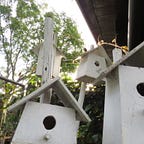Meeting Dickens
Reading David Copperfield for the first time
David Copperfield is slow, wordy, and cloy. It is, at times, infuriating. And it is also eminently delightful. My first Dickens has left me thirsty for more — and I don’t know why.
I found the novel tiresome at first. I have a great dislike for childhood prodigies — call it envy if you will — and thought David Copperfield another member of that insufferable species. Further, it seemed to me that every pauper, beggar, and peasant was the most virtuous, the most humble, and the most content to have ever lived; as if poverty had bestowed upon them an understanding that surpasses the material. Dickens’s sentimentality was a putrid toffee apple to the hard-edged tooth of my intellect; I bit in with a grimace.
But out of this dubious acquintance, Dickens marshalled a miracle and a mystery: he softened my hardness, and won me over. How exactly, I do not know. I can only point out three things I noticed and enjoyed:
My first revelation was that of the (fictional) writer behind the boy, the adult David Copperfield. At first, he seemed to me but a faithful scribe of memory, rather than the participant and friend he later becomes; a means to the end of the boy Copperfield, rather than an end in himself. l remember the moment my relationship with him began to transform: Copperfield makes light fun of his Mr. Peggotty’s speech when he pronounces his nephew’s name, “Ham”, as “Am” — transforming him into “a morsel of grammar”, as Copperfield observes. It is a trivial moment, but significant to me, because it is the first instance (I noticed) of the adult writer unintentionally revealing himself in an act of conspicuous description. I began to fully comprehend that we inhabit only one mind, and the full implications of this fact: that we never knew the young Copperfield, that he is only a memory, and that it is the adult who we care about and are interested in. There are of course many novels with a retrospective narrator; what is unique (or at least, one thing that is unique) about this one is the strength and distinction of the narrator’s character, and the friendship we form with him.
My next discovery was that Dickens is supremely funny. Of course I knew he was supposed to be funny — but it took me a while to get the sense of his sense of humour. It is wit that enlivens and justifies his flamboyant description, comedy that animates his characters, and tongue-in-cheek observations that drop a rope ladder down from his aether of fantasy to us, plodding on the ground. But his primary comedic genius, I think, is the humour of his manifold creations, the characters of the story: They are automatons or jukeboxes which lie scattered about, waiting for Copperfield to slip them a coin. They play only one or two songs (at the very most three), but play them so well, with so much colour, and dance along with so much vivacity, that we believe they must always have existed, and will exist forever — until Copperfield leaves them, and they settle once again into silence. We do not feel the characters have lives outside the narrative; we cannot imagine them doing something so ordinary and superfluous as eating food (unless in a celebratory manner); but when they enter it — what joy! Dickens’s humour carried me through the pages — neigh, it flipped the pages for me, so light did they become.
While I do feel most of Dickens’s characters lack an inner life — which is not a criticism — their relationships are full and deep and true. In David Copperfield we find a catalogue of every type of human relationship: the pure, innocent love of two children; a friendship of opposite sexes which amounts almost to siblinghood; the manly, protective love a son feels towards his mother; the admiration of a schoolboy for an older student; and even a friendship with a well-meaning but foolish and frankly bad friend (oh Micawber!). Each of these relationships — many of which I am still engaged in, being equivalent in age to Copperfield for much of the novel — rang like a bronze bell struck with perfect emotional pitch and clarity, vibrating with empathy in my tenderest organs. It defies imagination that a 38-year-old Dickens might understand youth so intimately — a perfect emotional memory I would call it. Agnes and Copperfield’s friendship in particular was of such a deep emotional truth that I shed a few tears when Heep’s tyranny was lifted — and I never cry when reading books. Another chord was struck by Copperfield’s faithful adoration and acceptance of his “child-wife”, Dora, in spite of her many shortcomings as a housewife. Theirs seems to me an almost ideal marriage, not because their complete compatibility (“There can be no disparity in marriage like unsuitability of purpose”), but because they are so committed to each other, despite their extreme disparity. It is such a strong depiction of the monogomous, matrimonial instinct, that it served as a deeply moving testament to marriage. The relationships in David Copperfield give the book its emotional depth and resonance.
If I must sum up what this novel has done to soften my cynicism, I would characterise it as a vast and gentle empathy, that embraces the characters and then the reader. But that is so general a statement as to be almost useless. Really, my overwhelming feelings are of surprise and confusion, growing gradually to awe. I still don’t know what in the dickens Dickens has done. It is infuriating: I cannot understand what possessed me to finish this book I so detested at first. But whatever it is, it is what distinguishes this esteemed author. I have met Dickens — that is all I can say.
